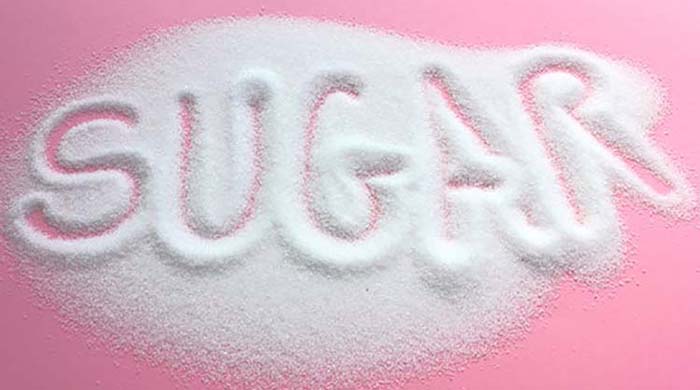
According to the CDC the top 10 causes of death are as stated…
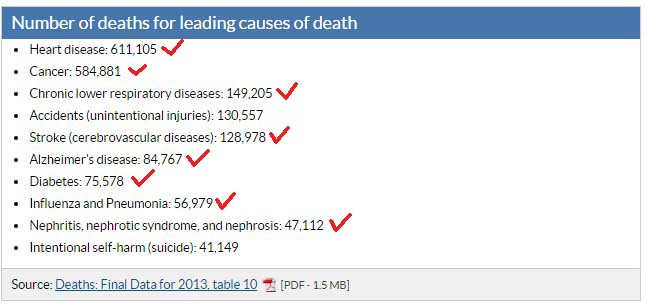
It’s my contention that sugar plays a direct or at the least an indirect role in 8 out of 10 of them.
It wasn’t until the last few years that we have learned the biochemical process of what sugar is doing to us on a molecular level. For the longest time we got sold a bill of goods.
We were told to lower our intake of fat. We were told eating fat is going to make us fat. Women were scared of making sure they avoided fats and lipids of all kinds for fear of putting on weight.
Boy were we lied to.
Turns out the real culprit all along was sugar, good old fashioned high fructose corn syrup amongst others.
Let’s look at some stats before we talk about how we were lied to.
The average American consumes roughly 66 pounds of “added” sugar each year.
That’s just “added” sugar!
Childhood obesity is on the rise in America with about 3 million kids being overweight.
And there’s new evidence from researchers in Denmark who recently revealed in a study that obese men have a genetically distinct signature in their sperm which leads scientists to now believe that obesity can be passed along to your children.
Passing on a fat gene? That’s nuts!
I mean this just isn’t normal…

And to make matters even worse, the companies that are adding all the sugar to their processed foods are now calling sugar by many different names in the hope that you won’t catch on.
Here’s just a few of them (56 to be exact)…
|
|
|
Just for clarification…
There are sugars that are long chain saccharides like polysaccharides, oligosaccharides and monosaccharides (like deoxyribose) that most people have never even heard of. You won’t find these sugars on any food lables.
These sugar molecules are long chain in nature, meaning they are polymeric carbohydrate molecules (in other words sugar) but they are not sweet. Sweet only pertains to a particular length of the saccharide molecule.
Interesting that if a food has “sugar” in it, it doesn’t necessarily mean that it’s sweet to your taste buds.
In any event, going off the list above, sugar has many names that are meant to trick you into believing a particular food has zero sugar in it.
These companies are sneaky.
They don’t make hundreds of millions of dollars for nothing. 😉
Also if you think aspartame is not harmful, think again. Dr. Betty Martini joined us during this episode to talk about just how destructive aspartame is on our health.
The conclusion of a recent study from Dr. Robert Lustig, featured in the video above states…
Concerns surrounding the role of sugar consumption in chronic dis-ease have previously focused on its caloric equivalence and its rolein fomenting increases in weight. Furthermore, previous clinical studies have relied upon excessive sugar administration, which intro-duces experimental artifact. This study mitigates all three of these concerns by intervening in children who are already sick with meta-bolic syndrome and by adjusting for effects of calories, weight gain, and adiposity. This study argues that the health detriments of sugar, and fructose specifically, are independent of its caloric value on effects on weight. Further studies will be required to determine whether sugar restriction alone can impact metabolic syndrome in adults and whether such effects are short-lived or long-term.
If the majority of your current diet consists of processed foods high in carbohydrates, you’re on the wrong path.
If you are going to eat foods that come in boxes and cans, then yes reading labels is a skill you want to get really good at. But my suggestion is that if a food has a commercial, comes in a box or can, don’t eat it.
The great fitness guru and nutritionist Jack LaLanne stated..
[spp-tweet tweet=”If man made it, don’t eat it!”]
Although I agree, that quote is a bit oversimplified because if Kate made a nice fresh green juice for me, I’d drink it, even thought it has some sugars in it.
But you get the idea. If it’s processed and has commercials for it and comes in a box or can, most likely it’s going to contain chemicals, heavy metals, processed sugars, toxins and even heterocyclic amines which might lead to cancer.
I can’t help but think of this from Raw For Beauty’s Facebook Page which exemplifies this perfectly.
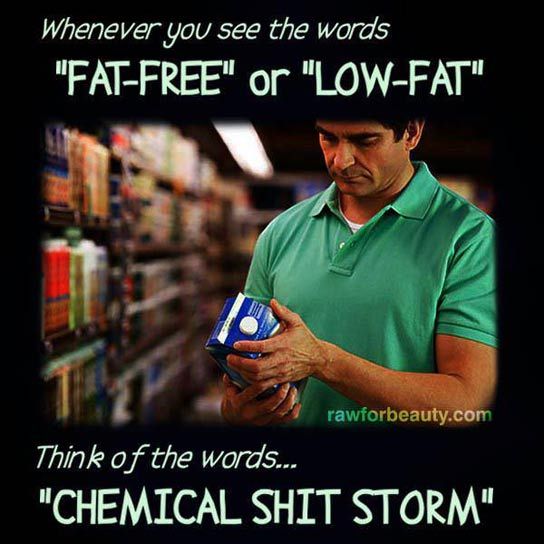
How Much Sugar Is Too Much?
Recently the World Health Organization recommended that children and women should reduce their overall calories from sugar to be less than 10% of their daily calories.
That’s a maximum amount, I suggest much less.
The American Heart Association suggests that “women consume no more than 6 teaspoons (25 grams) of sweetener per day and men no more than 9 teaspoons (38 grams).”
Kris Gunnars, BSc over at Authority Nutrition seconds this notion as well…

With that said….
The amount of sugar that’s going to be right for you will depend on many different factors like…
- Your stress levels
- The amount of physical activity you engage in daily & what types
- Your current state of health in terms of body mass index (BMI)
- What the rest of your diet is like
- And many more factors
Each of us require sugar to live. In fact you probably might not have known this but sugar molecules are in just about all food. You wouldn’t think this, but there’s sugar in broccoli and celery. You wouldn’t thing those items are sweet but they do contain small amounts of sugar.
So when people tell you to go on a no sugar diet, that’s just impossible. Your brain needs sugar and so do your organs. The important thing is realize is that we’ve way over done the sugar thing in our culture.
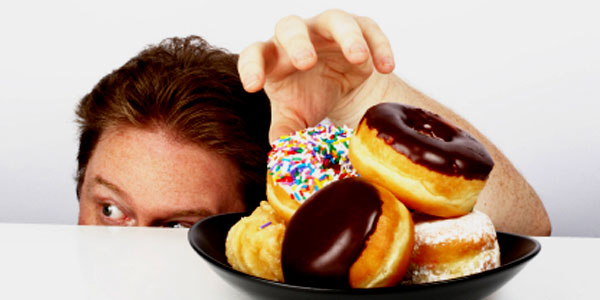
So it’s impossible to ingest zero sugar in your daily diet (unless you’re a breatharian) but what we need to do is find the optimal sugar levels for us.
The cleaner you get and more in touch with your body you become, the more sensitive to food you will be.
When I was a child, I had no idea where my heart, lungs, gall bladder, liver or pancreas was. But now I can feel liver stress or I can immediately feel indigestion coming on if I eat the wrong foods or if I eat them too fast without proper mastication and chewing.
I can feel for example if I eat eggs (a recent blood test showed a sensitivity) my heart starts to beat rapidly. An increase in your heart rate after eating a food can be a sign of an allergy or a sensitivity to that food.
You can measure your pulse before and after eating to determine this. I’ve gotten to the point now where I can just go by feeling.
If you feel your heart rate increase or if you feel a burst of energy (usually it’s just blood sugars rising) with a crash 20 minutes after you’re eating too much sugar.
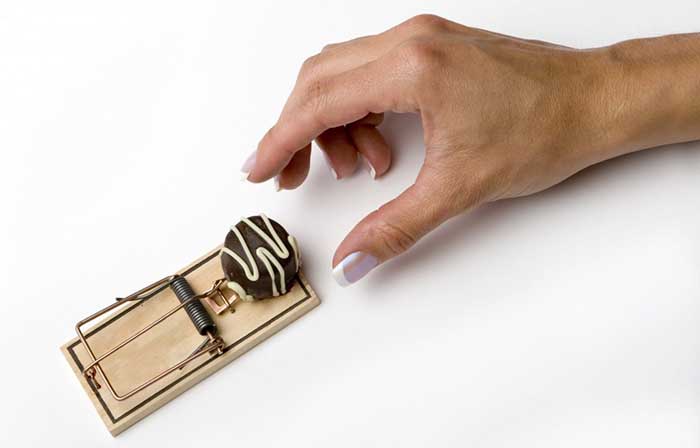
Dr. Frank Lipman has put together a good list of warnings signs you have consumed too much sugar.
Signs You’re Eating Too Mush Sugar
- Bloating
- Skin rashes
- Food cravings and addictions to sweets
- Cavities
- Fatigue or a general sense of exhaustion (lack of energy)
- Anxious or nervous
- Mood swings
- Farting or flatulence
- Poor digestion
- Dizzy when standing up
- Depression
- Susceptibility to colds or flu (Poor immunity)
- Can’t lose weight
- Can’t fall asleep within 5 to 10 minutes
And there are many more which you can read about the website called The Diet Cure by Julia Ross.
But remember even if you have none of the signs above, and you’re not actively working on your sugar intake, you may still may be eating too much. I suggest that you check your blood sugar levels as well as your insulin levels.
According to Dr. Hal Huggins and Dr. Jonathan Wright you should be around 75 to 80 upon waking up in the morning. More on that later…
What If I Eat Too Much Sugar?
I am not a dietitian (so this is just spiritual advice) so I’m not giving medical advice here. If you eat too much candy, ultimately what you do next is going to be your choice. I’m offering my experience and what I do when I eat too much sugar.
So take this health advice with a grain of organic sun dried sea salt. 😉
Step #1 – Be Kind To Yourself

Many people know their sugar limits and it’s pretty easy to know if you’ve eaten too much. The first thing you should do if you feel that you’ve consumed too many carbohydrates or sugar is to NOT beat yourself up.
You’re doing the best you can and everything is amazing and awesome in this moment. Realize that first.
Our mindset is absolutely key and highly critical. If you have a poor mindset and start going into victim mode right away, nothing you do on a physical level is going to be able to overcome polluted thoughts.
Love yourself and as David Jubb says, “be kind and gentle, soft and allowing” to your body and your cravings. Be kind to yourself by how you think about what you just did.
Step #2 – Eat Healthy Fat Or Protein
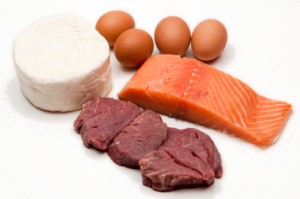
If I eat too much sugar even if it’s a green juice with too many carrots or if it’s some organic ice cream or Miracle Tarts, I have some fat with it. Now this works for me but as with just about every health dogma, there’s a conflicting opinion. A former guest Michael King from Vitality Herbs and Clay suggest that combining fats with sugars promotes yeast and candida growth.
To be honest I haven’t played around too much with his work in that way, so I can’t speak from experience and he may very well be right. Frankly it doesn’t matter who’s wrong or right, what matters is that you listen to your body and figure it out for yourself.
So for me, I eat some fat or protein to slow the absorption of the sugar into the blood stream.
Step #3 – Exercise
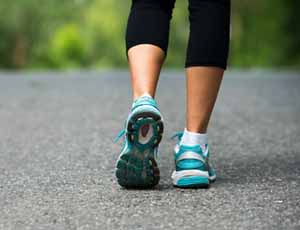
As a kid it’s amazing how much pancreatic enzematic activity is present in our bodies. I used to be able to eat a dinner of pizza (loaded with carbs, gluten, sugar and dairy) with a can of coke and have Halloween candy for dessert and feel amazing. I could go to bed within and hour after that or even sit in a movie while I ate candy!
But now if I eat a lot of sugar (and if I’m able) I like to go on a nice slow (but long) digestive walk. Nothing too strenuous. My body needs energy to break down that sugar, digest and absorb it. If I’m home and I can’t got for a walk I’ll do some light rebounding for 30 minutes or so.
A study in the Diabetes Care Journal suggested that a short 15 minute walk after each meal helped to normalize and stabilize blood sugar levels for 24 hours.
Speaking of diabetes I would suggest the book entitled, There Is A Cure For Diabetes by former guest Dr. Gabriel Cousens who runs The Tree of Life in Patagonia Arizona.
Step #4 – Supplement

There are some supplements you can take before, during or after your meals that will help better deal with eating sugar whether it’s from bread products, candy, soft drinks or even fruit juice!
It’s important to plan ahead.
If you know you’re going to go to a birthday party for example and eat lots of pizza and ice cream (or if you’re going to go out and drink a lot of alcohol one night) plan accordingly.
If you happen to be at home and have these types of minerals, herbs and supplements around you can always take some before or after your sugar bombed meal.
Here are some that you can buy at your local health food store or online that should really help. If you would like more detail about each of these natural sugar alternatives visit Craig’s article on Ruled.me.
- Cinnamon
- Probiotics (fermented foods like milk kefir, coconut water kefir or sauerkraut are even better)
- Gymnema Sylvestre
- Blood Sugar Balance (Tell Michael we sent you for free product on your 1st order!)
- Blood Sugar Improvement Formula
- Alpha-Lipoic Acid (ALA)
- Enzymes (digestive or pancreatic)
- Magnesium
- Eat protein
- Drink water
- B Vitamins
- Chromium
For a more complete list of supplements to take once you’ve consumed too much of the white nasty, I would read Ben Greenfield’s article by clicking here.
Look at how much work you have to do if you want to recover from eating too much sugar. Is it really worth it? How about avoiding it to begin with?
How Sugar Affects Your Health
You might think that all sugar does is give you cavities or make you gain weight. But what happens on the inside of the body at the cellular level is frightening. Processed sugar is a poison and leads to disease. Former guest Donna Gates wrote an interesting article about how sugar affects the body that I suggest you read.
Processed sugar (I need to stress that) absolutely ravage the body on the inside. It causes all kinds of microscopic explosions internally that if I could describe it, I’d have to compare it to wild fires here in Southern California each year.
Processed sugar is not your friend. If you’re craving it, most likely it’s not even you who are craving it, it’s the bad bacteria (like fungus, candida and yeast) that are screaming at you so they can be fed.
13 ways sugar affects your body…
- Lowers immune system – [source]
- Promotes inflammation – [source]
- Increases cancer risk – [source]
- Liver stress – [source]
- Increases triglicerides (what people call “bad” cholesterol) – [source]
- Increases diabetes risk – [source]
- Increases heart attack risk – [source]
- Weight Gain by creating a resistance to leptin – [source]
- Headaches – [source]
- Joint pain – [source]
- Constipation – [source]
- Mood swings – [source]
- Poor skin health (wrinkles, fine lines, age spots, saggy skin) – [source]
It’s one thing to use natural healthy alternatives to sugar but it’s another thing to have addictions and cravings that are insatiable. It’s the addiction to sugar you want to overcome and to do that takes time and a deep desire to overcome it.
Foods Highest In Sugar
Obviously you want to avoid eating candy and cokes. Did you know that in one can of 12oz coke there is 39 grams of sugar?
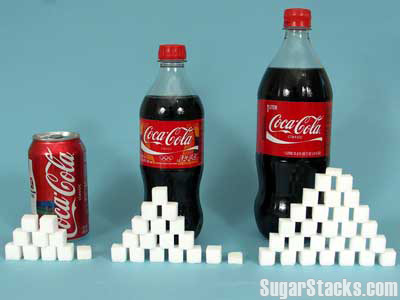
Candy also is loaded with unnatural processed sugars that are highly toxic and damaging to your immune system and cells.
Remember we are what we eat.
How are you going to build new cells that are going to help you thrive if you’re building them from genetically modified high fructose corn syrup?
I was recently talking with somebody who was talking about sugar. She was saying that life is hard enough without having a poor diet. I could tell she was stressed out, and pulled in every direction barely able to come up for air.
But she was trying.
She said, “why would I eat an inflammatory diet filled with sugar?” (It’s interesting the conversations you have that pop up right when you’re researching and writing an article about the dangers of sugar). Her basic sentiment was that life is hard enough, don’t make it harder by eating food that is going to cause further damage and hardships.
Although her language was very dis-empowering and not the type of language I try to use, I could see her point.
Don’t make life harder.
Give yourself every opportunity to at least have the option of thriving and doing good in the world. Being addicted to sugary foods is only serving the processed food giants, not you.
Outside of candy, and sugary soft drinks which we all know are full of sugar there are many other foods high in carbohydrates and sugar that you should be aware of.
Dried Fruit
Many people don’t know this but dried fruit is a fractionated food. By fractionated I mean it’s not a whole food with all of its parts. It’s missing the water content of the food which makes it highly digestible. The water inside a fruit or vegetable helps your body to break down that food.
All food during the digestive process must be converted into a liquid. Can you see how much work it takes to turn a dry cracker or dried piece of chicken into water?
It’s a lot of digestive work. Your body must create bile, pancreatic and digestive enzymes, hydrochloric acid and minerals to break food down into a liquid.
When you’re eating dried fruit you’re concentrating the sugars and starch. Dried fruit can be up to 81% sugar. These fruits include apples, bananas and even low sugar fruits like blueberries and raspberries.
Bread Products
I know this is going to be a major bummer for a lot of you. But you would be much healthier and better off in your life if you eliminated all flour and wheat products from you life.
Right now you’re not too happy about that statement but…
[spp-tweet tweet=”If you want what everybody else has do what everybody is doing. If u want something different, do something different everyday!”]
One of the main problems with bread and wheat products that nobody is talking about is the water that these products are kneaded with. The water that’s used to created bread products contains, chloramine, chlorine, homeopathic residues from chemotherapy and radiation, uranium, fluoride, mercury, PCB’s, MtBE, perchlorate, hexachlorobenzene (HCB), lead, arsenic, DCPA, dioxin, DDT and others.
Chemicals in our water are damaging to our health for many reasons.
On top of how damaging the water is that’s used when making bread products, those same wheat products are filled with processed and refined carbohydrates which are filled with sugar and end up spiking insulin levels leading to diabetes and insulin resistence.
You’d be better served removing all gluten sugar and dairy from your diet and you’ll notice a huge difference in not only your health but your energy levels as well.
Here’s a short list of other foods high in sugar that you might not know!
- Condiments (ketchup, mustard etc)
- Sauces (bar-b-que sauce, tomato sauce etc)
- Instant gravies
- Canned fruits
- Fruit drinks (apple juice, orange juice etc)
- Breakfast cereals
- Cookies
- Crackers
- Cakes
- Breads
- Pasta
- Pizza
- Ice cream
- Frozen yogurt
- Canned soup
- Salad dressing
- Granola bars
- And many more!
If you’re buying these types of highly processed foods, I encourage you to read the nutrition labels very carefully. If some sort of sugar ingredient (there are many names for sugar so refer to the list above of 56 names sugar can go by) is in the first 3 items listed put it back on the shelf!
[spp-tweet tweet=”If sugar is in the first 3 items listed on a #foodlabel, put it back on the shelf because it’s harming your health!”]
8 Healthy Alternatives To Sugar
In today’s world we have access to the best of the best and the worst of the worst. Many of these natural sugar alternatives weren’t even available just a few years ago.
My personal sugar alternative is green leaf stevia. Try to get the green leaf kind instead of the white granulated packets. These have been chemically extracted and no longer contain the buffering minerals and plant alkaloids that are present in the natural green form.
Remember get as close to nature as possible. Nature always wins.
As you move down this list of alternatives to sugar, remember the lower you go down the list, the more actual sugars there are (even if natural).
8 Natural Alternatives To Sugar
- Green leaf stevia
- Monk fruit
- Xylitol
- Lakanto
- Agave (Make sure it’s authentic)
- Black strap molasses
- Grade B maple syrup
- Raw honey
- And many others….do your research!
Katie over at the Wellness Mama has some practical approaches for having a healthy relationship with sugar.
Morning Blood Sugar Levels
One of the best times to check your blood sugar levels is in the morning. Dr. Hal Huggins likes to see morning blood sugar levels around 75 to 80 and you can adjust your diet to get to those levels.
You can check your blood sugar levels pretty simply each morning by getting a simple blood sugar monitor that will do the trick.
But remember, that just because your blood sugar levels are right where they need to be, that doesn’t mean your insulin levels are accurate. So if you’re having symptoms related to diabetes or pre-diabetes and your blood sugar levels are between 75 and 80 in the morning, then you might want to look at checking your insulin levels also.
Insulin resistance
A quick note in case you forgot. Lots of terms get thrown around in the alternative health and natural healing community. Terms like insulin, hypoglycemia, hyperglycemia, glycogen and others and it becomes very confusing.
Insulin is a hormone secreted by your pancreas to help regulate how much sugar circulates in the blood. Basically it helps your body from getting blood sugar that’s too high.
If you don’t have enough insulin then your blood sugars can soar resulting in diabetes and an entire cascade of inflammation to organ shut down.
Hypoglycemia is when your blood sugar gets too low and hyperglycemia is when your blood sugar is too high.
Insulin resistance can happen when you don’t even know about it. Your blood sugar and glucose levels can be normal but your body might not be making enough insulin or not properly utilizing it.
Here’s what conventional medical mainstream media has to say about insulin resistance…

You must realize the mainstream media promotes fear as does the medical industry. It’s the easiest way to elicit a weakened emotional response. Of course total dependence and reliance upon them and their solutions is the only way to treat (there’s never a cure in their model just a way to alleviate symptoms) diabetes.
But remember they are always only giving you one side of a many sided hyper-dimensional coin. Where there’s a will, there’s a way.
In a world of 7 billion people, there are always answers to any question or problem.
It’s up to us to find it. Just because they tell you something you don’t have to believe it. Their ideas are only opinion and not absolute truth.
What Should Your Fasting Insulin Levels Be?
Dr. Richard Massey along with Dr. Jonathan Wright suggest fasting insulin levels of around 2-6. Insulin levels are measured in “microunits per milliliter” (mcU/ml or mIU/ml).
Recent research suggested that women with fasting insulin levels of 8 had two times the risk of pre-diabetes than those women who had a fasting insulin level of 5.
Dr. Mercola has mentioned he like to see insulin levels below 5. As far as insulin levels are concerned it’s very important to know your numbers, especially as you age.
Dr. Mercola went on to say…
“the (insulin) number (is the number) that may best predict your sudden death.”
Low Sugar Diets To Consider
As we have seen previously in this article, sugar is highly inflammatory, incredibly addicting and is closely related to heart disease, weight gain, diabetes, cancer and a shortened life span.
That’s one side of the coin.
The other side of the coin is that our bodies need some sugar to live, it tastes good (even though sugars are mostly empty calories) and just about all food has sugar in it.
At some level, we cannot get rid of all sugar from our diets. Sugar and food differ from alcohol and drinking. Alcohol isn’t a necessary nutrient to live.
But sugar and food are.
W are forced to have some kind of healthy manageable relationship with them.
There are particular dietary strategies you can adopt that will help lower your sugar levels.
The Paleo Diet
What is the paleo diet? Well there is lots of controversy about just how natural is the paleo diet. Essentially the paleo diet tries its best to mimic our ancestral diet.
Our show with Mark Sisson from Mark’s Daily Apple lays this out beautifully.
There are many people who have healed from some intense diseases by adopting a paleo friendly diet. Danielle Walker from Against All Grain healed herself of a potentially life threatening form of colitis.
Dr. Jack Kruse (a neurosurgeon) lost 133 pounds in one year by adopting this kind of diet
What were we eating hundreds of thousands of years ago as a cave man? Well most likely we ate raw meat (sometimes cooked when we could), we’d eat insects, small animals like rodents, vegetables, eggs when we could scout them out, small amounts of fruits and some nuts. Maybe there were sprouts or legumes on hand.
But essentially what’s missing here?
Sugar, refined carbohydrates, wheat products and dairy products like milk, kefir, yogurt, cream, cheese and butter. So that means you wouldn’t catch a cave man eating a double cheeseburger on Wonder bread for a bun. There would be no candy, no wheat and flour products of any kind.
This is somewhat similar the diet that Sally Fallon from the Weston A. Price Foundation (which I HIGHLY suggest you learn about) recommends. Although they advocate some dairy products into your diet but it’s leaving out huge amounts of sugars and processed foods.
Dr. Terry Wahls has come of with the Wahls Protocol which is her own blend of a dietary approach she used to overcome multiple sclerosis which as you know is a debilitating disease that leaves people in wheel chairs!
Food is medicine. Sugar is not. 🙂
Ketogenic Diet
The ketogenic diet has been gaining in popularity recently due to its amazing healing properties and anti-inflammatory properties. It has also been touted as great for lowering cholesterol, losing weight, preventing and even reversing cancer and much more.
The way the ketogenic diet works…
The ketogenic diet begins with lowering the mount of net carbohydrates you consume in a day. Your body produces glucose to use and burn as fuel. This is the easiest form of energy for your body to create.
Since we consume so much sugar each day without much exercise, the body only uses a small amount of glucose for basic energy levels. The rest of the sugar travels throughout the body creating internal inflammation in the arteries causing microscopic scarring (which then raises cholesterol to repair damaged tissue), increasing weight gain and storing fat.
When you work with the body with proper diet and nutrition to lower carbohydrates, your body will eventually use fat as the fuel for energy instead of sugar. The liver will create keytones that travel throughout the body and create a healthier way of utilizing energy output.
The Take Away
The takeaway here is to work every day on lowering your sugar intake. Processed sugar is linked to so many diseases it’s just not worth consuming. If you want to increase your life span lower your sugar levels. If you want to prevent heart attacks, strokes and cancer, lower your sugar levels. If you want to increase your overall quality (not just quantity) of life, lower your sugar levels.
- If you are a man…limit your daily sugar intake to 9 teaspoons per day.
- If you are a woman…limit your daily sugar intake to 6 teaspoons per day
- Stop eating bread products
- Exercise more often
- If you do eat too much sugar, take supplements
- Always be kind to yourself 🙂
If you feel like you’re addicted to sugar and want to follow a step by step plan for getting off sugar, you might want to check out the I Quit Sugar program for some helpful resources. There are lots of foods and other empowering tools found at The Body Ecology website for those who want to dig deeper into this subject.
At Body Ecology you’ll learn how to restore gut function and reduce sugar cravings. Donna Gates is a wealth of information!
One final note…
If you want to listen to my story about 1 technique I used to eliminate my cravings for carbohydrates (I couldn’t have been more addicted to sugar!) click here to get my free audio program.
Question:
What are your favorite sweeteners and have you been able to reduce sugar from your life? If so, what has helped you the most?
Comment below!
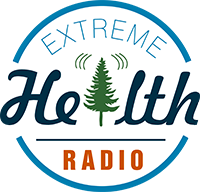
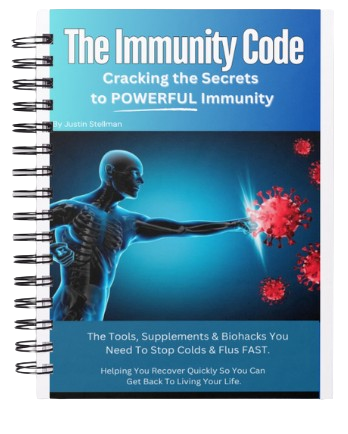

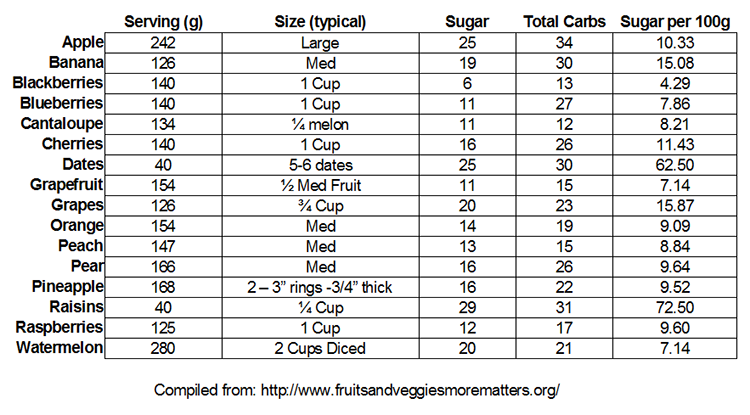

I found high dose pure Vitamin C erased my sugar cravings. A friend of mine who was a sugar junky tried this and also found it erased her sugar cravings. I used a 100% pure L-form ascorbic acid powder mixed in water (5 to 15 grams).
Over the years I cleaned up my diet but still had a bit of a urge to eat something sweet after dinner. After I started taking high dose vit C the urges disappeared.
Jeff that’s awesome thanks for sharing that!